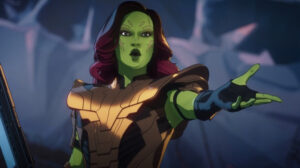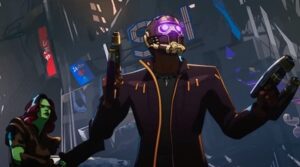SPOILERS FOR WHAT IF…? AHEAD!
Marvel Studios has churned out three live-action series’ for Disney+ this year, and it didn’t take them long to match or frequently surpass the quality of many of their movies. What If…?, on the other hand, has had scattered moments and two full episodes that I’d rank right up there alongside the best of WandaVision, The Falcon And The Winter Soldier, and Loki, but if this series is going to be a multi-season commitment for Marvel’s fledgling animation department (and it’s intended to be), then it’s going to need a little more work.

Leaving aside the fact that some episodes could be better described as mashups of two or more Marvel movies than actual “what if…?” scenarios, or the occasionally awkward facial animations and voice acting, What If…?‘s most consistent issue is that almost every episode is trying to squeeze an entire movie’s worth of plot and character development into the span of about twenty-five minutes, a good amount of which is often credits. This problem doesn’t necessarily have to be solved by making every episode forty to fifty minutes long, either. More focused writing would do wonders for What If…?.
For instance, this season finale didn’t need to be almost entirely an action sequence pitting the newly-formed “Guardians of the Multiverse” against Ultron (voiced by Ross Marquand), for several reasons. Firstly and probably most importantly, because it’s largely pointless. The Watcher (voiced by Jeffrey Wright)’s plan to defeat Ultron doesn’t actually rely on fighting him for a prolonged period of time, so this sequence feels like a waste of screentime that could have been better spent formulating a more efficient plan; perhaps one that would have given The Watcher something to do in this episode after how active he was last week.
And the longer this pointless sequence drags on, the more it robs Ultron of all the fear and awe he commanded in last week’s episode. Wielding all six Infinity Stones and possessed of reflexes and mental capacities beyond human comprehension, Ultron was capable of devouring entire galaxies last week – the only opponent who should logically stand a chance against him in battle for very long, out of this line-up at least, is Doctor Strange Supreme (Benedict Cumberbatch). I love seeing underdog characters use their unique skills to bring down an enemy twice their size, like when Star-Lord (Chadwick Boseman) gracefully snatches an Infinity Stone from Ultron’s collection using his “sticky fingers” technique, but Ultron is already depowered even before that, and it makes the whole battle less interesting.
The stakes are also surprisingly low for a series that’s so far been almost sadistic when it comes to killing off our favorite characters. For a moment, I hoped that Party Thor (Chris Hemsworth) at least would get to go out in a blaze of glory, after having served his only real purpose – unwitting bait for Ultron. But in fact, nobody dies. Technically not even Ultron, although it’s hard to describe what really happens to him: his body, or rather Vision’s body, gets taken over by the mind of Arnim Zola (Toby Jones), and his armor gets transferred to Erik Killmonger (Michael B. Jordan), who wants to use it to conquer the universe with the Infinity Stones, and both of them get locked up in a pocket dimension for all eternity, fighting over the Stones.

The Killmonger twist is one of many plot beats and character moments in this episode that required more time to develop organically. The entire build-up to Killmonger’s betrayal is one or two shots of him silently staring at an Ultron droid’s helmet. Similarly, Captain Carter (Hayley Atwell) sees one photo of Steve Rogers and suddenly wants to leave her timeline to go back and live with him. She ultimately decides against it, which I’m choosing to interpret as a jab at Steve’s out-of-character ending in Avengers: Endgame, but the whole scene feels too rushed to make this conflict or its resolution particularly interesting.
This feeling that we’re racing against the clock is compounded by another problem: none of the Guardians of the Multiverse actually know each other prior to this episode, and we don’t know them all that well – heck, this is our first time even meeting Gamora (voiced by Cynthia McWilliams), Destroyer of Thanos, because for some reason her individual episode got moved to season two – so they’re building relationships entirely from scratch, and without even so much as a common understanding of the universe to unite them.
The episode could have played on the radical differences between them to build bonds or create rifts and divisions, but this is an idea we only see realized through Captain Carter’s relationships with the two Black Widows (both voiced by Lake Bell). In her own timeline, their flirty banter is identical to that of Steve Rogers and Black Widow – which would be a lot more surprising and refreshing if it didn’t feel like What If…?‘s Captain Carter is literally just a reskin of Captain America. When she meets the haggard Black Widow of last week’s episode, she tells her things about herself that this timeline’s Widow wouldn’t have told a soul, proving her trustworthiness and unintentionally revealing that she and Widow are closer than Steve and Widow.
But that’s it. Other interactions, which could have been just as emotional if not more so, are ignored completely. Killmonger seeing T’Challa alive after murdering him in episode six should have been a humbling moment for him. Gamora talking about killing her timeline’s Thanos could have caused a clash with T’Challa, who successfully persuaded his timeline’s Thanos to see the error of his ways. And although zombie Wanda Maximoff shows up to fight Ultron and seems briefly confused by something, it would have been nice – and even more heartbreaking – to have explicit confirmation that she recognized her beloved Vision’s face on the android’s body.
Nonetheless, What If…? aims for an unearned heartfelt tone in its final minutes, as the Guardians go their separate ways. Obviously, the two endings that most fans will be talking about for weeks to come are Captain Carter’s and Doctor Strange Supreme’s: in a mid-credits scene, the former discovers the derelict HYDRA Stomper suit from episode one and is informed that someone is inside, setting up a Winter Soldier-type storyline for season two, while the latter is put in charge of protecting the pocket dimension where Zola and Killmonger are being kept, establishing him as The Watcher’s right-hand man and a being of infinitely more power than he could ever have obtained on his own. But neither ending really moved me.

What did tug at my heartstrings was Black Widow being given a second chance by The Watcher, being dropped into the timeline that lost its Black Widow back in episode three, and helping Captain America and Captain Marvel take down Loki (Tom Hiddleston), even though I thought somebody ought to have warned her that Hawkeye, Thor, and Bruce Banner had also died in that timeline. What did break my heart was seeing T’Challa fly off to save the galaxy once again, this time with Peter Quill (voiced by Brian T. Delaney) by his side, and knowing now that Marvel wanted to give the character his own spin-off series.
These characters, even their alternate versions, are what we fall in love with, they’re why we watch, and my only hope for season two of What If…? is that Marvel gives them the space and time to really shine.
Episode Rating: 6.5/10








